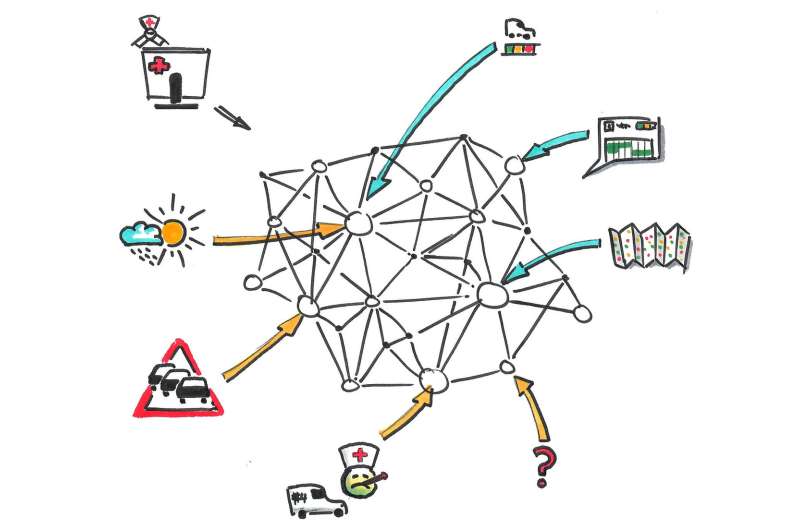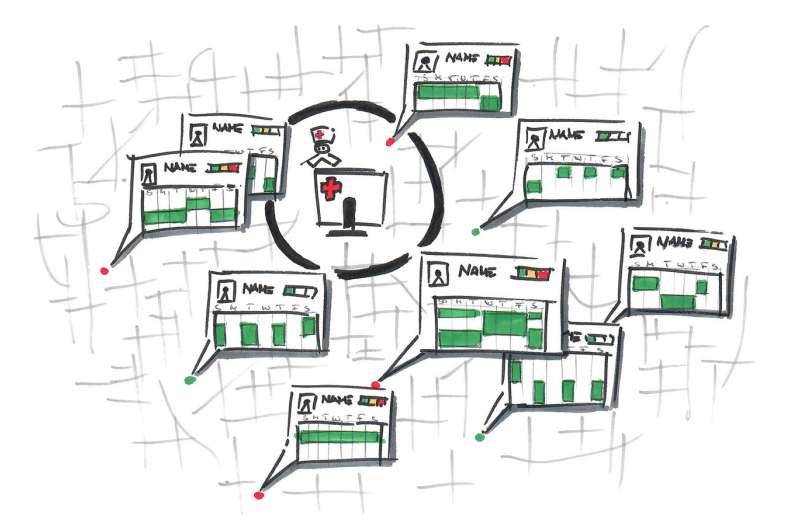Smart algorithms boost planning

Organizing care services is a complex task and a lot of planning goes into ensuring that they operate smoothly. Developed by adiutaByte, a spin-off project of the Fraunhofer Institute for Algorithms and Scientific Computing SCAI, adiuta.PLAN is a software package that can automatically create plans and factor in variables such as traffic levels and weather conditions in real time. The software also keeps plans updated to take into account other factors such as staff availability. Its innovative algorithms provide the perfect remedy for the grave shortage of care resources.
Every day, companies produce manual plans that are then adapted throughout the day, costing significant amounts of time and effort. It might be a service roster for a hospital, fleet planning for a parcel delivery company, shelf planning in a warehouse, or indeed a service roster for outpatient care. In this instance, the care service provider has to do their best to distribute work amongst the carers on duty. Although there are already tools out there in the marketplace to help care providers with this time-consuming task, none of them are able to monitor whether the service roster is actually feasible after the plan is made. What they fail to offer is a solution that can automatically generate and optimize plans. This is the gap filled by adiutaByte, a spin-off project from Fraunhofer SCAI, and its software adiuta.PLAN, which solves complex optimization problems with new algorithmic approaches, supporting care providers in the daily planning of care routes and helping them to assign carers to patients. Sectors such as logistics and warehouse management also stand to benefit from the solution.
Four people currently work on the adiutaByte team. The spin-off is planned for the first half of 2019, and is receiving funding from the Fraunhofer-Gesellschaft as part of the Fraunhofer INNOVATOR program as well as through Fraunhofer Venture. Team leader Dr. Dustin Feld explains the approach that contributes to adiuta.PLAN's success: "We're combining a range of algorithmic approaches, drawing on clustering techniques and artificial intelligence methods. Isolated conventional algorithms or closed-loop mathematical modeling are not enough in scenarios in which a system must react dynamically to unpredictable events such as traffic jams, road blocks or staff absences." Using a unique mix of algorithms, the adiuta.PLAN solution monitors travel and weather data in real time, and factors it into its planning.

Different applications require personalized solutions. The goal might be to provide carers with a schedule that guarantees them a stress-free day, or it might be a tight plan run with military precision. The solution offers a choice of routes – the fastest, the shortest and the most cost-efficient. If the chosen plan can be optimized in another way, adiuta.PLAN will also display possible alternatives and suggestions.
For instance, a road or bridge closure can throw a whole service roster off schedule. In such a scenario, the priority is to automatically update the plan as quickly as possible and compare the predicted plan against the actual situation. Other factors also play a key role in the optimization, including employee qualifications, customer preferences, staff absences and type of vehicle. "If a patient has a particular preference for a specific carer, our algorithms will automatically take that into account," says Feld.
The new automated solution offers great potential for optimization and savings, both in terms of time and administration, as the research team has successfully demonstrated in tests run on behalf of a 20-strong care team operated by the Johanniter humanitarian organization. "Normally, it takes the heads of the care team two hours each morning to draw up a plan for the 20 carers. With our solution, all they need to do is approve the automatically generated plan proposal," says the computer scientist. The time needed for carers to get to and from appointments was also reduced by ten percent.

Machine learning is another tool that can be used to increase the optimization potential still further: "Let's take the example of drawing a blood sample. We know that the time taken to complete the task may well vary depending on the carer and the patient. Over a longer period of time, the algorithms can learn how long it usually takes, meaning that future service rosters more accurately reflect the reality of the situation," explains Feld.
adiuta.PLAN can be integrated into existing software solutions and, first and foremost, supplies the core algorithms, so that users can continue working in their preferred environment. Care providers can manage the optimization target and prioritization via a series of controllers and buttons. adiutaByte can also supply personalized user interfaces at the customer's request. Mobile apps allow carers direct access to the plan while on the move.
Provided by Fraunhofer-Gesellschaft


















